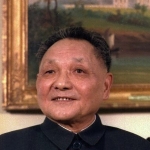Background
Yang Shangkun was bornon August 3, 1907 in Chongqing, China of a large and well-to-do family.

Yang(right) with Nikolai Bulganin
杨尚昆
Yang Shangkun was bornon August 3, 1907 in Chongqing, China of a large and well-to-do family.
Yang Shangkun attended a middle school in Chongqing where, under the influence of a cousin, he participated in underground activities for the Chinese Communist Party (CCP). In 1945 he went to Shanghai and joined in the Party's student activities. Then he proceeded to Moscow in 1930 and enrolled in the Sun Yat-sen University for working Chinese, founded in a joint venture bemeen Russian Soviet Communists and Chinese Socialist revolutionaries, led by Wang Ming. Of the more than 1,000 students studying or receiving revolutionary training in Moscow, Yang Shangkun was one of the famed Chinese Twenty-Eight Bolsheviks who graduated from the Sun Yat-sen University. It was in 1925 when Deng Xiaoping left France and moved to Moscow that the two became friends and Yang, in later years, became one of Deng’s closest advisers.
Yang Shangkun returned to China in 1931 and plunged immediately into Party affairs, serving variously as propaganda chief for the guerrilla armies and as head of the Party's training school. In 1934-1935, he took part in the Long March by supporting Mao Zedong in the power struggle at the historic enlarged Politburo meeting at Zunyi the meeting which ushered in Mao's rise as the Party leader and marked the gradual demise of influence by Moscow-oriented Stalinist Chinese Communists. However, Yang Shangkun had Mao's trust, so that in 1941 he served as secretary for the Party's central office and sat on the military affairs committee headed by Mao. For some time thereafter he served as secretary for military affairs until the mid-1950s. From 1955 to 1965 Yang Shangkun was elected to the Party’s Central Committee. For many years he was also director of the Central Committee’s general office, responsible for security and living arrangements for the top Party leaders.
Yang Shangkun was purged during the Cultural Revolution and lost all of his Party positions. He spent time, as did many other prominent leaders, in the countryside doing manual labor. He was rehabilitated in 1978 together with a host of other veteran Party leaders as Deng Xiaoping returned to power.
In 1981 Yang Shangkun was designated by Deng Xiaoping to serve as secretary for the Military Affairs Committee (MAC), of which Deng was chairman. Two years later he was elected to the Politburo and held the vice-chairmanship of the powerful Military Affairs Committee under Deng.
In 1988 Yang Shangkun was elected president of the People’s Republic of China (PRC) while concurrently holding the position of vice-chairman of the Military Affairs Committee. Along with Deng, he was awarded the rank of general for the military. During the 1989 student demonstration at Tian-anmen, on May 19, Yang Shangkun, as the Republic's president, along with Li Peng, the premier, declared martial law. On June 2, Deng Xiaoping and Yang Shangkun ordered the troops to move into the square to forcefully terminate the students, demonstration.
In the aftermath of Tiananmen, one of the most significant personnel changes in the military was Deng's resignation from his long-held chairmanship of the powerful MAC. His successor to that post, tantamount to commander-in-chief for the entire armed forces, was not Yang Shangkun, but the new Party general secretary Jiang Zemin, who up until then had had hardly any experience with the military. However, the real power of the military rested with Yang Shangkun, who became the first vice-chairman of the MAC. In addition, Yang's brother, Yang Baibing, became permanent general secretary of the MAC. There were some complaints inside and outside the military that the Yangs had made the military their "family enterprise."
Continued discontent within the military motivated some officers from the Shenyang, Beijing, and Nanjing Military regions to produce a secret anti-Yang Shangkun circular. They accused Yang of refusing to support Jiang Zemin as party chief and of nepotism by appointing his brother as general secretary of the MAC, while concurrently serving as director of the military's General Political Department. The resentment against increasing domination and control of the military by the Yang brothers reached its height when some 20 senior retired generals confronted Jiang Zemin, the Party chief, on the eve of the August 1, 1990 Army Day to register their complaints and concerns.
Presumably, the removal of the Yang brothers from positions of power at the 1992 Party Congress assuaged the resentment against them within the military command. This was followed by a massive purge of nearly half the generals who were considered to be followers of the Yang brothers. This move was considered essential to ensure Deng's hand-picked successors survival in case of a possible military coup in future power contests. In March 1993 Yang Shangkun was replaced by Jiang Zemin as the Republic’s president.
Yang Shangkun died in September 1998 at the age of ninety-one as the last of the Twenty-Eight Chinese Bolsheviks.
Yang Shangkun married Li Bozhao in 1929, one of the few women to participate in the Long March, as did Yang. They had three sons.
(m. 1929; her death 1985)

